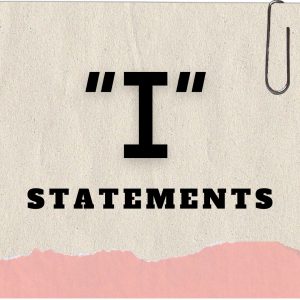
Do you dread confronting your spouse when (s)he has inadvertently hurt you?
Does it seem that difficult conversations cause your significant other to become defensive?
Do you wish your arguments were more productive?
It is important to communicate clearly and to be assertive, for our well-being as well as the health of our relationships. However, when addressing our thoughts, emotions, and issues, the approach we take can make or break a discussion. Speaking with consideration and care to avoid provocation can position each partner to listen attentively and have a constructive conversation.
Many people are in the habit of confronting others using a “You” statement, which places blame and responsibility on another’s shoulders, causing that party to become defensive.
If a spouse is awaiting his/her significant other to come home one night, a “You” statement might sound like: “You are late for dinner again! Why do you always make me wait on you?”
This approach alienates the partner, leading him/her to feel ambushed. Rather than focusing on the issue at hand to promote intimacy and resolutions, this statement emphasizes blame and promotes a sense of disharmony.
An alternative approach is the “I” statement, which emphasizes our own emotions and concerns while relaying what behavior of the other party has brought about this response.
An “I” statement might sound like: “I feel concerned and frustrated when you come home late because I don’t know what is keeping you or how to plan for dinner.”
An “I” statement is more constructive than a “You” statement because it focuses on the core issue while minimizing the fault. Moreover, by sharing feelings, “I” statements take emotional responsibility, and demonstrate trust in the other partner.
An “I” statement has three segments:
- I feel ______________
(Share your emotions.)
- when you ______________
(Recount the action that impacted you.)
- because _______________.
(Expound on how the action affects you or promotes that emotion.)
In some cases, you may find it beneficial to add a fourth segment, describing what you would prefer to take place in the future.
For instance, you may say:
“I become overwhelmed when you raise your voice because it reminds me of moments in my childhood when I didn’t feel safe. Could you please keep your voice lower when we discuss things?”
“I feel insignificant when you answer work calls while we are on a date because it seems as if I am not enough to keep your attention. Would you consider putting your phone on silent until our date is over?”
“I feel hurt when you make plans without discussing it with me first because I feel as if my work schedule isn’t taken into consideration. Can we make it a habit to run things by one another before setting the calendar?”
Often “I” statements take a period of adjustment to become a regular practice. It may require forethought and extra effort to be taken when addressing your loved one. However, over time you will find that this approach leads to better conversations and a healthier, happier relationship.


